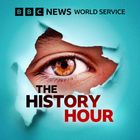
The History Hour
Jun 25, 2022
In June 2012, Egypt held its first ever free democratic Presidential election. Mohamed Morsi, representing the Muslim Brotherhood, emerged victorious. Ben Henderson spoke to Rabab El-Mahdi, Chief Strategist to one of Morsi’s rival candidates. She described what it was like to be involved in the first election of its kind, how Morsi tried to recruit her, and the personal impact of political campaigning in such a polarised country.
In June 1982 a young Chinese-American engineer was murdered with a baseball bat by two white men in the US city of Detroit. The lenient sentences the perpetrators received sparked an Asian-American activist movement with protests across the US. At the time, America was going through an economic depression and many blamed Japan, which was perceived to be flooding the US with its cars. For Asian-Americans, it was a time of fear. Farhana Haider spoke to Helen Zia, one of the activists who led the fight for justice. This programme was first broadcast in 2017.
In 2003, Dr Nayana Patel, who ran her own fertility clinic in the state of Gujarat in India, carried out her first surrogacy procedure. It involved a surrogate mother and her own daughter. Dr Patel's clinic would go on to become one of the biggest in India attracting Western couples. It was legalised in 2002 but due to growing criticism, the government banned couples from the West from paying Indian surrogates to bear their children in 2015, arguing that the industry was exploiting poor women. Reena Stanton-Sharma spoke to Dr Nayana Patel.
In 1985, the first robot-assisted medical surgery took place in Vancouver, Canada. It’s now become a standard feature of operating theatres worldwide. The original gadget was named Arthrobot. A member of the original project team, Geof Auchinleck, told his story to Kurt Brookes. A Made in Manchester production.
The UK’s first official gay Pride march took place 50 years ago – on 1st July 1972. Alex Collins talked to Ted Brown, who took part in the London march.

